“Brown Girl Dreaming” (Paulsen/Penguin 2014) is Jacqueline Woodson’s memoir about growing up in a loving, but broken family,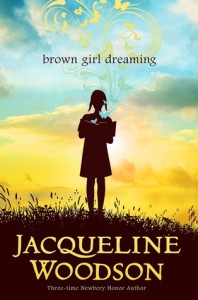 in the midst of the Civil Rights Movement. Written in accessible vivid verse, and a National Book Award Finalist—we’ll find out tomorrow, November 17, whether it wins. It should.
in the midst of the Civil Rights Movement. Written in accessible vivid verse, and a National Book Award Finalist—we’ll find out tomorrow, November 17, whether it wins. It should.
To set the time frame, the March on Washington took place in August 1963 the year of Woodson’s birth. LBJ signed the Civil Rights Act in 1964. Jacqueline is born in Ohio to a southern mother and a northern father whose grandparents were free men during slave times. The Woodsons were doctors, lawyers, and teachers.
He refuses to visit his wife’s family—the Irbys—in Greenville, SC, saying, “Told her there’s never gonna be a Woodson/ that sits in the back of the bus./ Never gonna be a Woodson that has to/ Yes sir and No sir white people./ Never gonna be a Woodson made to look down/ at the ground.”
So Mama takes her three young children south. Their father shows up, apologizes, but the marriage breaks up soon after. The three children go live with their Irby family in Nicholtown—the black community of segregated Greenville—filled with the scent of pine, honeysuckle and slow days.
Jacqueline is the youngest and not yet one year old. Readers can refer to the Woodson-Irby family tree—their birth and death dates—at the front of the book and handsome family snapshots in the back.
In Nicholtown, Gunnar Irby, Mama’s Daddy, becomes “Daddy” to Jacqueline because that’s what Mama calls him. And he fills the role.
Mama takes off for New York to start a new life. She’ll send for the children as soon as she can. In New York, Jacqueline’s younger brother, Roman, is born.
Jacqueline is not as good a student as her big sister Odella, but she loves words. She knows she wants to write. She adores “Daddy,” her grandfather who sings as he walks the dusty road home from work. After he dies, Grandmother says, “I watch you with your friends and see him all over again.”
Jacqueline Woodson is true to her youthful self and to young reader. She writes, “Sometimes, I don’t know the words for things,/ how to write down the feeling of knowing/ that every dying person leaves something behind.”
The children move to New York, but the grace of the south lives within them. They are urban and country and feel out of place in both places.
As Jacqueline grows up, she refers to song lyrics and MoTown artists. She riffs on Love Train/Soul Train. Her mama loves James Brown. Her Uncle Robert is too wild and pays for it in prison. Jacqueline sees Angela Davis on TV saying “Power to the people.” The Black Panthers are feeding breakfasts to black children out in Los Angeles. You feel the excitement first hand.
I want to quote this whole book so you know its beauty. It’s probably better to buy it or get it from the library.
Patricia Hruby Powell’s book Josephine: The Dazzling Life of Josephine Baker won a Boston Globe Horn Book 2014 Honor for Nonfiction and a Parents Choice Gold Award for Poetry.
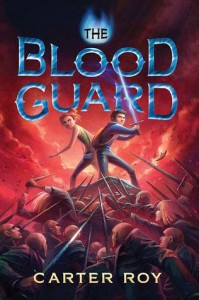 departments.
departments.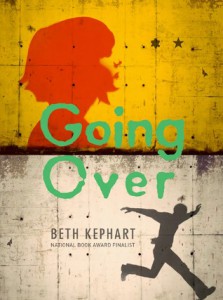 Berlin (a federal republic) and did not come down until 1989. For those 28 years the Wall and its towers and armed guards prevented the mass defection from the communist East Bloc to the free west during the cold war. Families, friends, and lovers were split apart.
Berlin (a federal republic) and did not come down until 1989. For those 28 years the Wall and its towers and armed guards prevented the mass defection from the communist East Bloc to the free west during the cold war. Families, friends, and lovers were split apart. A subplot involving Ada’s favorite Turkish pre-schooler, Savas, and his abused mother brings out an aspect of the story of Berlin of which I knew nothing. In fact I’ve read no other fiction involving this dramatic historic era and place. The relationship of the grandmothers gives us a view of young adults in war time Berlin, countering the punk history of the two protagonists.
A subplot involving Ada’s favorite Turkish pre-schooler, Savas, and his abused mother brings out an aspect of the story of Berlin of which I knew nothing. In fact I’ve read no other fiction involving this dramatic historic era and place. The relationship of the grandmothers gives us a view of young adults in war time Berlin, countering the punk history of the two protagonists.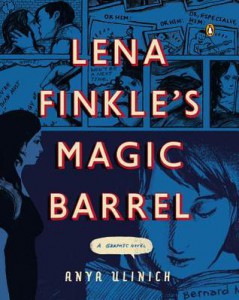 also be popular with young adults. The story of Lena, a 17 year old Russian immigrant moving with her parents to Arizona in the 80s, appears to be Ulinich’s thinly disguised memoir.
also be popular with young adults. The story of Lena, a 17 year old Russian immigrant moving with her parents to Arizona in the 80s, appears to be Ulinich’s thinly disguised memoir.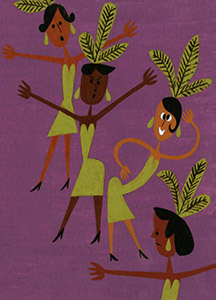 in her soul. From an early age, she was happiest when performing in front of an appreciative audience. Because of her race, she was often relegated to dressing the dancers, but Josephine worked hard and learned all the dance moves, just in case. When she got the chance to perform on stage, she took it, eventually catching the eye of a benefactor who invited her to perform in Paris, where she stepped into the spotlight and became a star across Europe. Through her bold performances and natural fearlessness she ultimately pushed through the boundaries of segregation in America to become an international performing star. The unadorned narration of the blank verse text is lovely and vibrantly read by veteran actress Lizan Mitchell. Her voice is full of the same energy and verve Josephine embodied. The text is mostly narrative and no dialog, sprinkled with occasional quotes from Josephine herself. Mitchell fluidly reads the lovely verse, “knees squeeze, now fly/arms scissors and splay,” that captures Josephine’s uninhibited nature so well. Jennifer Berberugge State Library Services Roseville MN
in her soul. From an early age, she was happiest when performing in front of an appreciative audience. Because of her race, she was often relegated to dressing the dancers, but Josephine worked hard and learned all the dance moves, just in case. When she got the chance to perform on stage, she took it, eventually catching the eye of a benefactor who invited her to perform in Paris, where she stepped into the spotlight and became a star across Europe. Through her bold performances and natural fearlessness she ultimately pushed through the boundaries of segregation in America to become an international performing star. The unadorned narration of the blank verse text is lovely and vibrantly read by veteran actress Lizan Mitchell. Her voice is full of the same energy and verve Josephine embodied. The text is mostly narrative and no dialog, sprinkled with occasional quotes from Josephine herself. Mitchell fluidly reads the lovely verse, “knees squeeze, now fly/arms scissors and splay,” that captures Josephine’s uninhibited nature so well. Jennifer Berberugge State Library Services Roseville MN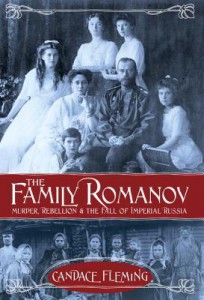 telling the complex Russian history through the eyes of both nobility and peasantry.
telling the complex Russian history through the eyes of both nobility and peasantry.